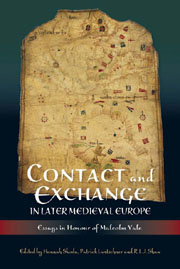Conclusions
Published online by Cambridge University Press: 05 February 2013
Summary
Hearing the name of the new MP for Maidstone in 1932, Alfred Bossom, Winston Churchill was delighted: ‘How extraordinary!’ cried the great statesman, ‘It is neither one thing, nor the other!’ This oft-recycled bon mot could serve as a (rather irreverent) text for the papers in this collection, which have been very much concerned with the ways that real people and their interactions confound or complicate the identities, roles and solidarities that populate the pages of history books. Focusing on processes of contact and exchange, and the forms that accompany and derive from them, these essays confront the reader with ambiguities, mis-connections and ironies – with the gaps between linguistic identities and political allegiances; the unexpectedly inclusive results of municipal assertion; the sudden demonisation of familiar aliens; the revised cultural meanings ascribed to foreign texts and exotic objects as they cross borders; the sometimes circumspect, sometimes disruptive, play of networks and influences across the solidifying boundaries of England, France and Scotland. The aim of the editors, in commissioning these papers and organising the conference at which they were initially presented, was to consider how a closer attention to the practices of contact and exchange might challenge the paradigms in which later medieval history is characteristically written, to see whether – in a ‘new mapping’ of Europe – we might give priority to a different set of units and boundaries, to different players and associations from those heuristic models authorised by the long dominant traditions of national and statist history.
- Type
- Chapter
- Information
- Contact and Exchange in Later Medieval EuropeEssays in Honour of Malcolm Vale, pp. 267 - 276Publisher: Boydell & BrewerPrint publication year: 2012

